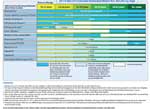Adult Immunization
40,000-50,000 adults die annually from vaccine-preventable diseases in the US
Immunization (also called vaccination) is a safe, effective and simple way to prevent life-threatening infections – not only for infants and kids, but also for adults. Getting immunizations can help keep you from getting sick and severely ill. Plus being immunized can help protect those around you from getting sick.
Immunizations work by teaching your body how to fight the germs that cause infections. Thanks to immunizations the number of people who die from infection has gone way down. Immunizations usually come in shots, but some come in nasal sprays or medicines you swallow.
Which immunizations should you get? That depends on your age, your general health… even your lifestyle or profession can make a difference in which immunizations you need. That’s why you should talk to your internist.
Your internist might recommend the following vaccinations:
Influenza (the flu)
Every winter a wave of influenza sweeps the nation. For healthy adults, it can mean days in bed with a fever, cough, and body aches. The flu can be life-threatening for people age 50 or older or those with chronic health conditions. This vaccine comes in shots or nasal spray so be sure to check with your doctor to find out which one is right for you. It is recommended that ALL adults receive the flu vaccine every fall.
Pneumococcal Infections (pneumonia)
These infections of the lungs, blood-stream or brain cause 15,000 deaths each year in the United States, while a single shot decreases serious illness and death. If you are between the ages of 19-64 and smoke cigarettes or have a chronic medical condition you should get this vaccine. All adults aged 65 and older should get the pneumococcal vaccine once. If you are over 65 and your pneumococcal vaccination was more than five years ago, ask your doctor about a booster.
Tetanus-Diphtheria (Td) and Tetanus-Diphtheria-Pertussis (Tdap)
All adults aged 19-65 years need a one-dose Tdap if they have not already received one and adults aged 65 and older who have close contact with infants should get a single dose of Tdap to prevent whooping cough. Adults should get a Td booster every 10 years to protect themselves against these life-threatening infections. Not sure if you’re due? Check with your doctor.
Herpes Zoster (shingles)
All adults aged 50 and older should get this one time vaccine to prevent shingles- a painful belt-like rash that can be complicated by bacterial skin infections, eye and ear problems, and debilitating pain that can last months to years after the rash goes away. Ask your doctor if this vaccine is right for you.
Human Papilloma Virus (HPV)
Young women between the ages of 9-26 should receive three doses of this vaccine to prevent genital cancers and precancers. Young men between the ages of 9-26 should receive three doses of the vaccine to prevent genital warts and anal cancer.
Meningococcal
Adolescents between the ages of 11-54 who are at increased risk for invasive disease should consider getting this vaccine. This includes college freshmen living in dormitories, military recruits and people who have immune system problems.
Hepatitis A (liver infection)
Adults older than 18 years who are in close contact with international adoptees, illicit drug users, men who have sex with men, have chronic liver disease, or are travellers to endemic countries should get two shots of this vaccine 6-12 months apart.
Hepatitis B (liver infection)
All adolescents up to age 19 should receive this series ofthree shots over a six-month period. In addition, adults older than 19 who have high risk sexual behaviors, injection drug use, work in health care or public safety, hemodialysis patients, liver disease patients, HIV or travellers to endemic areas should be vaccinated.
Measles, Mumps & Rubella
If you never had these diseases as a child, nor were immunized against them, talk with your internist. They are highly contagious (can be caught just by talking with an infected person) and have serious complications for adults. Two shots given at least one month apart will protect you.
Chicken Pox (varicella)
If you were the only kid on the block who didn’t get chicken pox, you should be the first in line to get immunized against it unless you are pregnant! A relatively mild illness in kids, it’s usually very serious in adults.
Immunization Schedules for Adults
You never outgrow the need for vaccines. The specific immunizations you need as an adult are determined by factors such as your age, lifestyle, high-risk conditions, type and locations of travel, and previous immunizations.
 in Easy-to-read Format
in Easy-to-read Format
Adult Immunization Schedule
The following insets are also provided by Center for Disease Control and Prevention
_____________________________________________________________________________________________________
_____________________________________________________________________________________________________
_____________________________________________________________________________________________________